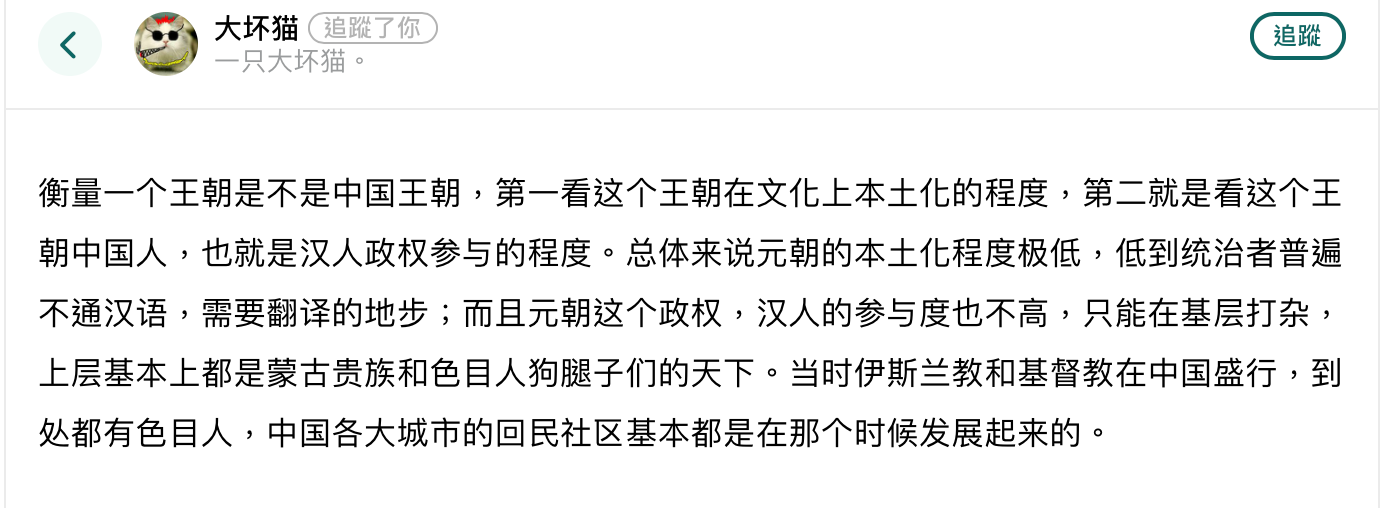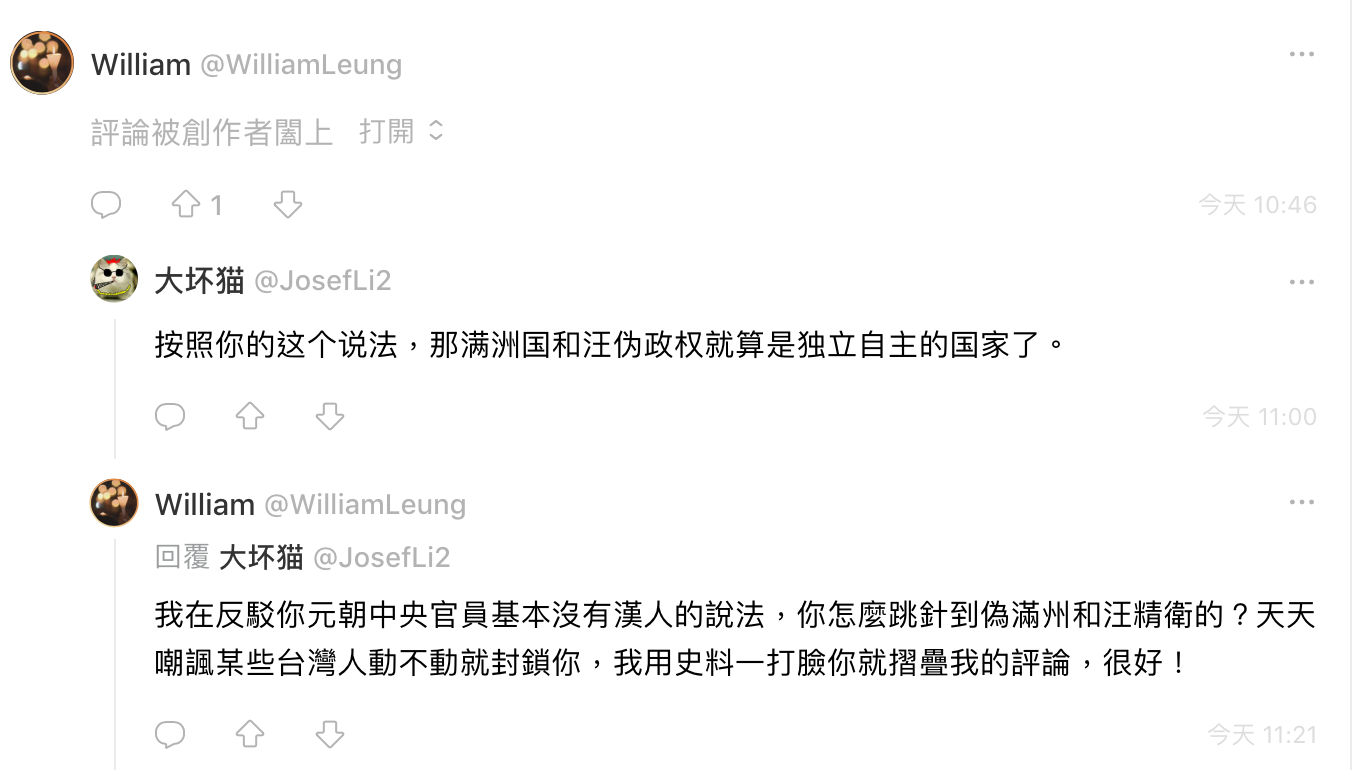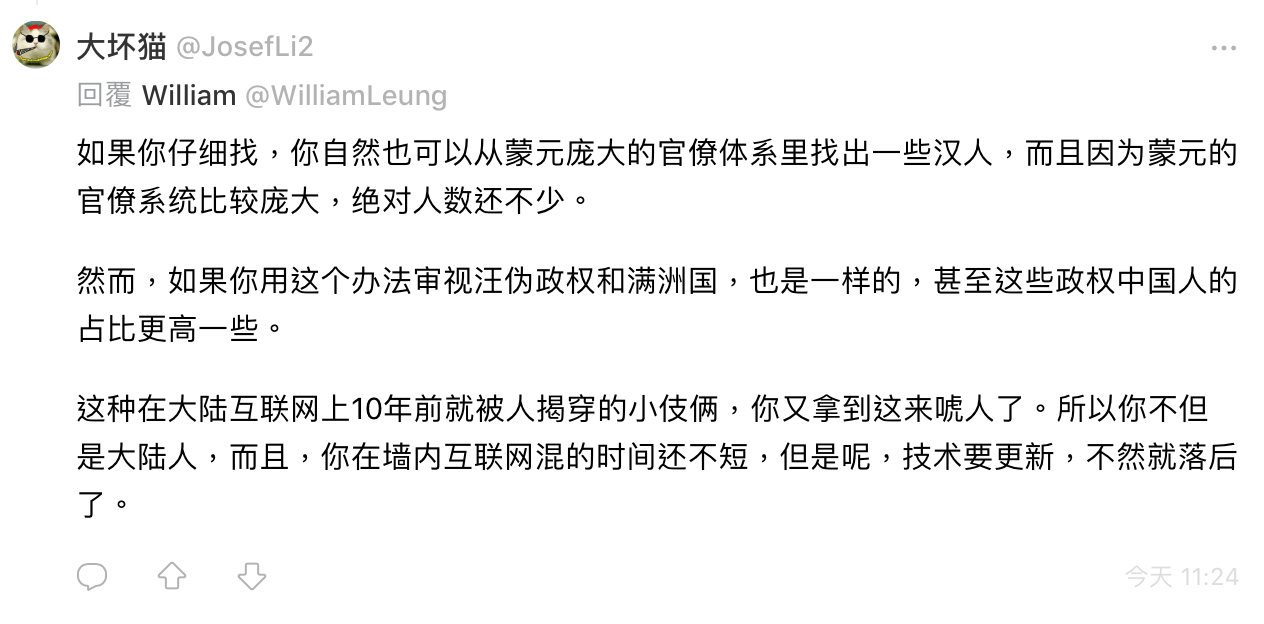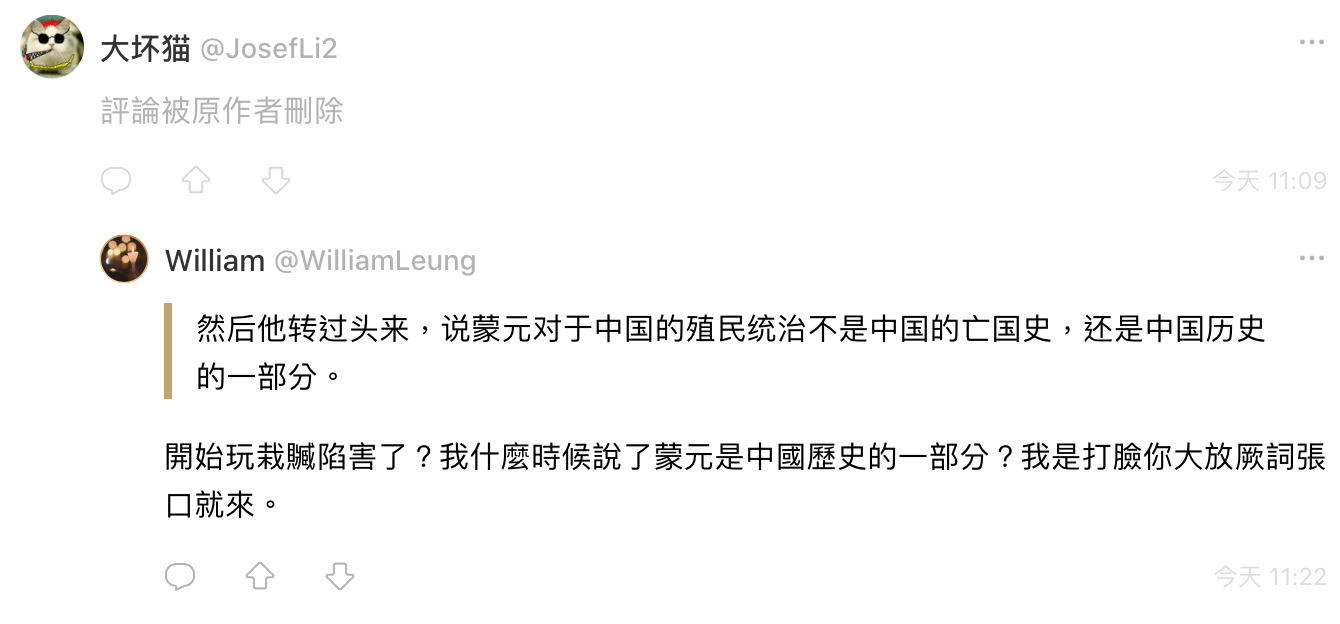
新加坡可能是华人世界的唯一曙光
Wonderful flower every year
@Big Bad Cat has published long articles on this site for a long time, but almost every article has basic factual errors. Sometimes I point it out when I have time, and most of the time I don't bother to pay attention to him. He published another great article today, " The Great Battle for Recognizing Fathers in Chinese History ", and made another basic historical fact error. He originally said:
"Generally speaking, the localization level of the Yuan Dynasty was extremely low, to the point that the rulers generally did not understand Chinese and needed translation; and in the Yuan Dynasty, the participation of the Han people was not high, and they could only do chores at the grassroots level, and the upper levels were basically Mongolians. The world of nobles and scumbags.”

Of course I can't stand such obvious low-level mistakes, so I casually quoted the research of Dr. Fang Jun from the Hong Kong Institute of Education, pointing out that there were also a lot of Han bureaucrats in the upper echelons of the Yuan Dynasty.
"In fact, in the Yuan Dynasty, quite a number of Han Chinese held high-ranking positions in government at all levels, many of them being senior positions. We can see this clearly from the following examples.
In the central government agency of the Yuan Dynasty, the Premier of Zhongshu Province was the executive. Its highest official was Zhongshuling, who "orders hundreds of officials and decides general affairs" (Song, 1976). Since Kublai Khan, the ancestor of the Yuan Dynasty, this position has been held concurrently by the crown prince. Usually, what he does is only to go to the middle of the month to spy on the yamen. Therefore, the actual chief of the Zhongshu Province is the right and left prime ministers with the title of Zhengyi. They "unified six officials, led hundreds of officials, and ranked second to orders" (Song, 1976). Under the right and left prime ministers, there are "second prime minister" Pingzhang political affairs of the first rank, the right and left prime ministers of the second rank, and the minister of political affairs of the second rank. The above-mentioned officials are collectively referred to as "zaizhi". In the Yuan Dynasty, there were not a small number of Han people who served as "zaizhi", and only the right and left prime ministers served as the political affairs of the peace chapter: Shi Tianze, the right prime minister; He Sheng, He Weiyi, the left prime minister; Wang Wentong, Zhao Bi, Shi Tianze, Zhang Hui, Song Zizhen, Zhang Yi, Ye Li, Zhang Jiusi, Liang Degui, Wang Qingduan, He Renjie, Li Meng, Zhang Gui, Zhang Lu, Liu Zheng, Wang Yi, Jing Yan, He Weiyi, Ding Haoli, Leshi and others (Song, 1976 ; Wang, 1992).
In the Yuan Dynasty, the Privy Council "was in charge of the secret affairs of the world's military armour. All the palace guards were banned, the military wing of the side court was sacked, the garrison was attacked, the brief reading was sent, the merits were made, and the dispatch was controlled." (Song, 1976). Its highest officer is nominally a privy envoy who is also held concurrently by the crown prince, but the actual officer is a member of the Privy Council (from the first grade), the deputy is Tongzhi (the second grade), the deputy shu (from the second grade), and the court (from the second grade). Positive third-grade), Tongji (positive fourth-grade), and court judgment (positive fifth-grade). The Mongolian rulers have repeatedly banned the Han people, but even so, a considerable number of Han people still hold high-ranking officials in the Privy Council. Among them, those who hold the highest positions in the academy include He Jun, Zhiyuan; Tongzhi Li Meng, Li Baobao, Liu Halabuhua, and Wei Saiinbuhua (both Liu and Wei are Han Chinese with Mongolian names); Deputy Shu Zhao Bi, Shi Tianze, Chen Zuren, Wu Yuangui, Shi Gui, Li Ji, Shang Ting, Zhang Wenqian, Wang Yue, etc. (Song, 1976; Wang, 1992). It is worth pointing out that before the positions of Tongzhi and Zhiyuan were established in the seventh year (1270) and the twenty-eighth year (1291) of Zhiyuan, the position of the deputy envoy of the Privy Council in the Privy Council was second only to that of the prince who was concurrently held by the crown prince. emissary. Therefore, Zhao Bi and Shi Tianze, who served as deputy envoys in the early years of Zhongtong, had a very high actual status in the academy.
As for the Censor Desk, which "checks the good and evil of all officials, political gains and losses", there is also a Han Chinese (He Weiyi) who is the chief officer of the Censor Desk (Cong Yipin). And the second-ranking person in the Censor Desk, Censor Zhongcheng (the second grade), has nearly 20 Han Chinese. They include Zhang Qiyan, Wei Chu, Cui Yao, Yang Jukuan, Li Ji, Pi Silian, He Rongzu, Zhang Xiongfei, Zhang Yan, Liu Habuhua, Geng Huan, Dong Wenyong, Dong Shizhen, Dong Shoujian, Zhang Gui, He Wei et al. (Song, 1976; Wang, 1992).
At the local level, rank followed Yipin's line and called the province, "in charge of the general affairs of the country, overseeing the prefectures and counties, the towns and borders, and the capital province as the outside and inside" (Song, 1976). Its chiefs are the Prime Minister of Cong Yipin, Pingzhang Political Affairs, the Right and Left Prime Ministers of Zheng Erpin, and the political participation of Cong Erpin. Among the Han people who have served as provincial prime ministers are Shi Tianze, Gao Xing, He Weiyi, Fang Guozhen, Zhang Shixin and others. As for Pingzhang, there are more than a few dozen people. Zhang Hui, Gao Xing, Pengfei, Dong Shixuan, Wang Bosheng, Lv Tianqi, Shi Ge, He Wei, Gao Fang, Yao Wei, Shi Bi, Liu Guojie, He Renjie, Cao Li, Zhao Xun, Zhang Hao, Gao Jianu, Zhou Quan , Li Heng, You Xian, Liu Zheng, Zhang Wenqian, Li Dehui, Hong Junxiang, Hong Baobao, Zhang Lu, Liang Zizhong, Shang Hao, Song Azhong, Li Haowen, Liu Halabuhua, Sun Deqian, Zhang Xi, etc. At the end of the Yuan Dynasty, there were still more than a dozen people including Li Siqi, Kong Xing, Wang Yi, Wang Xin, Fang Guoying, Fang Guozhen, Fang Mingshan, Li Keyi, Shen Rong, Liu Yi, Guo Yun, Zhang Shicheng, Chen Youding, Zhang Sidao, Zhang Pu, Zhang Shide, and Feng De. (Song, 1976; Wang, 1992).
From the examples cited above, it is not difficult to see that there were quite a lot of Han people holding high-level official positions in the yamen of governments at all levels in the Yuan Dynasty. In fact, in the "Yuan Shi", "Xin Yuan Shi", and "The Mughal Historic Records", there are eight sixty-four names and three grades. Among the above officials, Han nationality accounted for 409, or 47% of the total (Wang, 1992). Not only that, but the Han people who held official positions in the Yuan Dynasty government, in addition to the Han nationality officials who held high-level officials in the Zhongshu Province, the Privy Council, the Censor Office and the Xingzhongshu Province listed above, also served as ministers in the six ministries. You can find them everywhere. On the whole, Han people not only held a lot of prominent positions in governments at all levels of the Yuan Dynasty, but also held a lot of official positions. It can be seen from this that the so-called "senior officials at all levels of the Yuan Dynasty must be held by Mongolians or Semu people, and the Han people can only hold deputy positions at most" is not an accurate expression of the Yuan Dynasty's tears. We say this with the fact that there was serious racial discrimination in the Yuan Dynasty. "
Obviously, the historical data I quoted was only aimed at him: "In this regime, the participation of the Han people is not high, and they can only do miscellaneous tasks at the grassroots level. , pointing out that Han officials accounted for almost half.
But I never imagined that this wonderful Taiwanese who often laughs at some Taiwanese who block people with different viewpoints at every turn, folded my comment backhand in a fit of anger, and deducted a token for Manchukuo and Wang Jingwei to wash the ground. hat.


I was quite surprised. I didn't mention Guo Manchukuo and Wang Jingwei. How did he skip the needle? How did you come to such a series of conclusions?
Then he turned his head and wrote a comment scolding me. He blatantly called a deer a horse, stuffed what I didn't say into my mouth and scolded me for being extremely anti-China, anti-China vanguard, etc., trying to extend the general historical controversy into a national Contradiction, the contradiction between anti-communist and pro-communist. " Then he turned his head and said that the Mongolian and Yuan's colonial rule of China was not the history of China's subjugation, but part of China's history," he said.

The point is that my original comment was clear. I didn't mention a single word here about whether Meng Yuan was a Chinese colonial rule. It was just a slap in the face of his basic historical facts. It is estimated that he also felt that it was inappropriate to blatantly frame things like this, and he was still embarrassed, so he deleted this comment, and I only left a short paragraph of the original text. Most of them are actually scolding me as a traitor and a traitor in the name of Dayi. I didn't have time to take a screenshot, which is a pity.
After reading the above operations, it is really hard to laugh or cry, wonderful things happen every year.
Like my work?
Don't forget to support or like, so I know you are with me..
Comment…